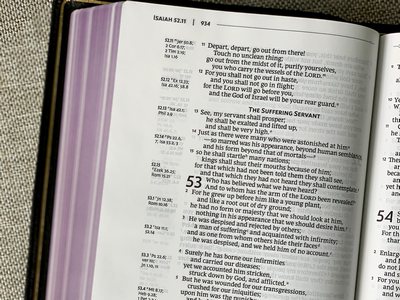A Man Of Sorrows – Part One

The prophet Isaiah has been referred to as the Messianic prophet. The reason for such is that Isaiah goes into great detail about the Messiah, Jesus. While Isaiah never refers to Jesus by name, it is extremely apparent to a studied Bible student that Isaiah wrote of the Christ. In Isaiah chapter fifty-three, Isaiah revealed some very specific characteristics of man’s Savior.
First of all, Isaiah described the Messiah “…as a tender plant, and as a root out of a dry ground: he hath no form nor comeliness; and when we shall see him, there is no beauty that we should desire him” (Isa. 53:2). This is a direct contradiction to what many artists have depicted of Jesus. Jesus was not an effeminate looking man with striking features. Jesus was a supposed carpenter’s son (Matt. 13:55). He would have been a hard working, “common man”. The Lord would not come in the grandeur of what many Jews perceived. Instead, as Isaiah had previously written, “And there shall come forth a rod out of the stem of Jesse, and a Branch shall grow out of his roots” (Isa. 11:1).
Isaiah further described the Messiah as “…despised and rejected of men; a man of sorrows, and acquainted with grief: and we hid as it were our faces from him; he was despised, and we esteemed him not” (Isa. 53:3). It is hard to imagine a Jew reading that verse and still expecting the Messiah to be like a David or Solomon of old. Rejection was something with which our Lord became familiar. John explicitly stated, “He came unto his own, and his own received him not” (John 1:11). Jesus became hated by so many for doing nothing more than the Father’s will. The Lord told His apostles, “If the world hate you, ye know that it hated me before it hated you” (John 15:18).
Their hatred toward Jesus was so strong that even after Pontius Pilate acknowledged “JESUS OF NAZARETH THE KING OF THE JEWS”, we find that “Then said the chief priests of the Jews to Pilate, Write not, The King of the Jews; but that he said, I am King of the Jews” (John 19:19, 21). They truly despised the Lord! The reference to the Messiah being “a man of sorrows” is very telling. When one goes back and studies the great suffering that Jesus withstood, it becomes very apparent that the designation is true. From being scourged, having a crown of thorns placed on his head, mockery, and crucifixion our Lord truly understood sorrow (John19:1-3, 18). I can only imagine the grief that Jesus experienced when those that He loved so much rejected Him. “O Jerusalem, Jerusalem, thou that killest the prophets, and stonest them which are sent unto thee, how often would I have gathered thy children together, even as a hen gathereth her chickens under her wings, and ye would not” (Matt. 23:37)!
It was then that Isaiah described the Messiah this way: “Surely he hath borne our griefs, and carried our sorrows: yet we did esteem him stricken, smitten of God, and afflicted. But he was wounded for our transgressions, he was bruised for our iniquities: the chastisement of our peace was upon him; and with his stripes we are healed…the LORD hath laid on him the iniquity of us all” (Isa. 53:4-6). Matthew referenced Isaiah’s prophecy when he wrote, “When the even was come, they brought unto him many that were possessed with devils: and he cast out the spirits with his word, and healed all that were sick: That it might be fulfilled which was spoken by Esaias the prophet, saying, Himself took our infirmities, and bare our sicknesses” (Matt. 8:16-17).
In regard to the issue of transgressions and iniquity, the writer of Hebrews stated, “So Christ was once offered to bear the sins of many; and unto them that look for him shall he appear the second time without sin unto salvation” (Heb. 9:28). When referring to Jesus, Paul wrote, “Who was delivered for our offences, and was raised again for our justification” (Rom. 4:25). Further, Paul mentioned to the churches of Galatia that Jesus “…gave himself for our sins, that he might deliver us from this present evil world, according to the will of God and our Father: to whom be glory for ever and ever. Amen” (Gal. 1:4-5). Peter also referenced Isaiah’s prophecy when he wrote, “…because Christ also suffered for us, leaving us an example, that ye should follow his steps: Who did no sin, neither was guile found in his mouth: Who, when he was reviled, reviled not again; when he suffered, he threatened not; but committed himself to him that judgeth righteously: Who his own self bare our sins in his own body on the tree, that we, being dead to sins, should live unto righteousness: by whose stripes ye were healed” (1 Pet. 2:21-24).
~ Corey Barnette


